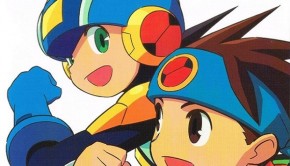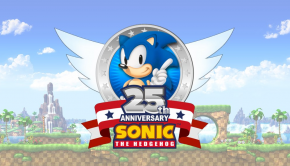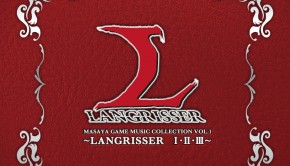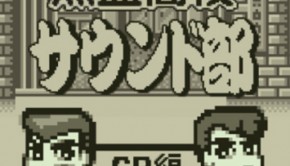Star Trek -The Ron Jones Project- Computer Game Music
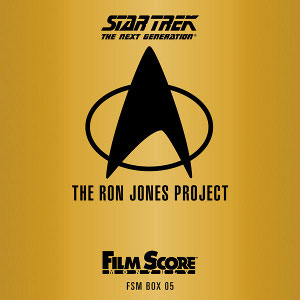 |
Album Title: Star Trek -The Ron Jones Project- Computer Game Music Disc |
| Record Label: Film Score Monthly |
|
| Catalog No.: N/A |
|
| Release Date: October 13, 2010 |
|
| Purchase: Buy at Amazon |
Overview
Among the many, many meritorious soundtrack releases that record label Film Score Monthly has compiled in its history, 2010’s Star Trek: The Next Generation – The Ron Jones Project was one of its most ambitious undertakings. A gargantuan 14CD set, The Ron Jones Project put together 40 complete episode scores by Jones for the first four seasons of Star Trek: The Next Generation, plus bonus tracks from fan favourite The Best Of Both Worlds – and Jones’ scores for Starfleet Academy (1997) and Starfleet Command (1999) on one the box set’s CDs. Particularly Starfleet Academy, with its impressive production values that included the participation of actors from the original Star Trek TV series, had remained one of the most fondly remembered Star Trek games – and what’s more, it also contained one of the first Western orchestral game scores.
Jones became involved with the game through his film scoring teaching role at the University of Southern California when some of his previous students, now working at developer Interplay, asked Jones whether he was interested in writing the music for Starfleet Academy. Convinced by Interplay’s assertion that “they wanted to do this like a movie and they wanted it scored like a movie”, Jones signed on to write his first video game score. Coming from a background in film and TV, one of the challenges Jones faced was to write music whose mood could be modulated instantly depending on the player’s actions. Jones solution was to use “tempos and key relationships and orchestration so they would seamlessly go from piece to piece and have transitions possible at any part of the cue.” Without access to the themes he wrote for Next Generation, Jones composed a new Starfleet Academy theme and delivered the soundtrack within a month, with additional music for the game’s briefings and cut scenes provided by Brian Luzietti. Realising the music’s potential, Interplay then released Starfleet Academy‘s music on a separate CD with some editions of the game. Of course, these promotional copies were soon very hard to find and Starfleet Academy‘s score became a much sought after rarity. This situation was somewhat rectified with the release of The Ron Jones Project, although having to spend $150 – the box set’s cost – to access Jones’ 25 minutes of music for the game certainly wasn’t the ideal solution.
Like Starfleet Academy, Starfleet Command was a space flight simulator, this time letting the player control ships of various Star Trek races, both classic and newly designed for the game: Klingon, Romula, Gorn, Hydran and Lyran – and humankind’s Starfleet, of course. Once more without access to any of the themes from the Star Trek TV shows, Jones had to write his own themes for these different races, including new takes on the musical identity of franchise stalwarts like the Klingons and Romulans. Interplay gave Jones almost complete freedom to musically explore the game’s protagonists and Jones proceeded to fashion “a different texture and a different vibe for all these races.” Due to the game’s smaller budget, Starfleet Command‘s orchestral score was recorded in Salt Lake City rather than in Los Angeles’ Burbank, where Starfleet Academy had been put to tape.
Body
Among Jones’ game scores on The Ron Jones Project, Starfleet Academy is clearly the stronger entry, realising the game’s cinematic ambitions to thoroughly satisfying results – Starfleet Command‘s bold enthusiasm effortlessly imbues it with the spirit of spacefaring adventure that informs the best Star Trek soundtracks. Jones’ grabs the opportunity to write for a full orchestra outside of the restrictions of a TV series with both hands and delivers a full-bodied, skilfully orchestrated score that might well be the best Star Trek game soundtrack composed so far. These qualities are most convincingly displayed on the album’s opening track “Opening” (the track titles on the Film Score Monthly release are good bit more prosaic than on the score’s original 1997 album release). Alexander Courage’s classic theme for the original Star Trek TV series is expertly woven into the composition, but it’s Jones’ Starfleet Academy theme that takes centre stage – a beautifully sweeping melody that is less audacious than Courage or Jerry Goldsmith’s Star Trek themes, but which nonetheless maintains the sense of wonder and noble exploration that is so central to the Star Trek franchise (at least before the 2009 reboot). “Opening” beautifully develops its expansive melodies while injecting brief moments of swashbuckling action and quieter passages to keep things varied, fully justifying the decision to record Jones’ music with a live orchestra that brings out the warm melodicism of this piece. While Starfleet Academy‘s recording is hardly the last word in presence and clarity, it outclasses Quest for Glory V: Dragon Fire among other early Western live orchestral scores. Ultimately, it’s no surprise that “Opening” was included on Silva Screen Records’ third instalment of its highly regarded Space and Beyond series – Jones’ overture is strong enough to hold its own against many of the Star Trek themes written for the franchise’s feature films.
Jones’ other compositions for Starfleet Academy, squarely separated in battle cues and non-action pieces, don’t quite reach the same level as “Opening”, but they’re not far behind. While Jones’ half of Starfleet Academy‘s score is a bit heavy on action music and doesn’t always make full use of its melodic potential, the score’s quieter moments still make their mark through their compositional quality and substance. “Exploring #1” continues “Opening”’s spirit of exploration and adventure in stirring fashion with its expansive string melodies, but its lighter orchestrations – including a celesta – and elements like the chromatic ululations in the woodwinds and strings during the track’s second half create an element of mystery that’s both enchanting and intriguing, and which suits the cue’s title perfectly. “Exploring #2” takes the more ominous aspects of “Exploring #1” and subtly moves them into more quietly volatile terrain, without sacrificing the alluring promise of discovery that made both pieces so attractive. The Starfleet Academy theme is reprised in creative fashion to adapt to the darker, haunting environment, which turns “Exploring #2” into a somewhat subdued tension builder that is still colourful and full of musical ideas. Lastly, “Crew Introduction” is the album’s most light-hearted track, featuring the Starfleet Academy theme in a tender rendition and easily capturing the sense of aspiration and hope that would dominate a place like Starfleet Academy.
Jones’ action tracks are equally strong and are particularly commendable for their ability to avoid the pitfalls that militaristic game action music faces regularly: monotony through repetitive snare drums and string ostinati, topped with snippets of “heroic” brass inserts. Jones is smart enough to change orchestrations on a claustrophobic tension builder like “Losing Combat #1” frequently, making sure that the woodwinds get to add some colour to the proceedings. “Losing Combat #1”’s ingredients are minimalist – crisis string motifs, percussive piano chords, sharply rising brass figures – but they’re varied and effective enough to never let the track’s momentum flag and to help the cue convincingly escalate into a loud climax. “Tied Combat #1” and “Tied Combat #2” are similar to “Losing Combat #1”, benefiting like all of Jones’ music on Starfleet Academy from his ability to write well-developed, imaginatively orchestrated compositions that despite their frequent changes in material, colour and rhythm flow well – listen to how the martial rhythms on “Tied Combat #1” are partially supplied by the orchestra’s light percussion, which helps these rhythms to avoid becoming too plodding and dominating. “Tied Combat #1” and “Tied Combat #2” hold back less than “Losing Combat #1”, both cues moving forward at a steady, but never monotonous pace that keeps the music constantly exciting, particularly as “Tied Combat #1”’s climax keeps pushing the music higher and higher. “Winning Combat #1” and “Winning Combat #2” allow for more heroism and melodicism as they return the Starfleet Academy Theme to celebrate the battle turning around in favour of the player. “Winning Combat #1” comes closest among Jones’ tracks on Starfleet Academy to sounding a bit too much like other, similar pieces, but it’s still noteworthy for presenting the album’s most determined rendition of the Starfleet Academy Theme. The intensity of Jones’ action music is brought to a head on “Losing Combat #2”, whose dire and discordant melodic material prepares the ground for brass fanfares that are more hammering than their predecessors on earlier cues, and the music turns more and more intense in the cue’s second half, drawing to a dramatic and impressive close.
Starfleet Command‘s 32 minute score and its presentation on The Ron Jones Project are more problematic. The first obvious issue is the music’s sound quality. Likely due to the above mentioned budget restrictions and change of ensemble and recording venue, Starfleet Command‘s orchestral sound is significantly thinner than that of Starfleet Academy, falling behind even very early Western orchestral scores like Quest for Glory V: Dragon Fire. The result is that Jones’ compositions have a lot less presence than previously and since Starfleet Command focuses more on action tracks than Starfleet Academy, this shortcoming particularly manifests itself as a lack of punchiness from which several cues on Starfleet Command suffer. Secondly, while Film Score Monthly’s decision to present Starfleet Command‘s entire score is commendable, this results in a fragmented album flow that is interrupted by too many short filler cues. For each of the six races, Jones writes a “Menu Screen,” “Mission Start,” “Faster,” “Mission Failure” and “Mission Success” cue, and the “Mission Start” and “Faster” tracks are only brief interludes that hold limited musical interest outside of the game. On top of this, the “Mission Failure” and “Mission Success” cues only just creep past the one minute mark, which means there’s not much space for the kind of sweeping overtures and melodies that have made Star Trek scores so popular. Also, since the menu screen/failure/success etc. tracks are always sequenced in the same order for each race, the album flow becomes not only disjointed, but also predictable.
All that being said, within these restricting circumstances, Jones writes some worthwhile material, although even his compositions themselves don’t measure up to Starfleet Academy. Each race gets its own theme that is heard throughout its compositions. In the case of Starfleet, it’s a generic, if memorable enough brass motif that returns throughout “Federation Menu Screen” in various disguises and on different instruments, a clear sign that while Starfleet Command‘s melodic content is largely restricted to its themes, Jones’ orchestrations usually present these themes in sufficiently intelligent and varied manner. The nobility of “Federation Menu Screen” is translated into solemnity for “Federation Mission Failure”, where the Starfleet theme returns on solo trumpet, recalling the patriotic moments of more than one World War II shooter score. “Federation Mission Success” presents the same theme in a far more upbeat version and with its energy makes for a fitting close to the Starfleet/Federation section of Starfleet Command.
While the Starfleet/Federation pieces are pleasing enough but quite vanilla, it’s the Klingon and Romulan tracks that are the most interesting thing about Starfleet Command. Jones was particularly enthusiastic about his music for the Romulans, saying that he “got to develop ideas that never got developed on the show, so I got to write the Romulan theme I never got to write on the show”, something “much more fanfare-oriented”. Indeed, the Romulan cues on Starfleet Command are the score’s brass-heaviest moments, but they deliver also the soundtrack’s most rhythmic and martial tones. Keeping in mind the fact that the term ‘Romulan’ is derived from ‘Rome’, Jones’ fanfare-heavy treatment of this race almost feels like a conscious and welcome throwback to scoring conventions for biblical epics. The proud and escalating nature of the Romulan theme, exhibited on “Romulan Menu Screen” and “Romulan Mission Success”, isn’t communicated with ideal force due to the shortcomings of the album’s sound, but it still has the capacity to impress. Jones also manages to transform the militaristic Romulan theme on “Romulan Mission Failure”, quoted here on muted woodwinds against deep, sparse percussion strikes and brooding strings. Sticking to Star Trek scoring traditions, Starfleet Command scores the Klingons with a focus on various colourful percussion instruments and tribal elements, best presented on “Klingon Menu Screen”. Like the jagged, constantly driven composition itself, the Klingon theme that the cue introduces is multi-faceted – sneaky yet defiantly rising, slightly bumbling in its upwards-downwards motion and when presented on woodwinds less noble then what one might expect to represent the mighty Klingon warriors. Jones continues to bring some interesting ideas to the Klingon’s table: “Klingon Mission Failure” further highlights that the Klingon theme is more malleable than the Federation theme, sounding a lot more desolate in this instance, while “Klingon Mission Success” feels less like a celebration, but rather like a tribal procession that still possess a good amount of force.
Unfortunately, while the remaining races – Gorn, Hydran and Lyran – gave Jones the opportunity to write some truly original music, their compositions feel blander than the mostly familiar musical identities accompanying the already established races of Starfleet Command. The best of the bunch is the Gorn material, which mixes the shadiness of the Klingon material and mixes it with the martial nature of the Romulan tracks, particularly on “Gorn Mission Success”. The Gorn theme isn’t particularly memorable, but “Gorn Menu Screen” gets some mileage out of it by passing it back and forth between oboe and trumpet, after the track has established a foreboding and ominous mood in its first half. While not at the same level of the Starfleet, Klingon and Romulan cues, the Gorn compositions are still suitably atmospheric. However, they also herald a move towards music that focuses on mood rather than melody or rhythms, which leads to a drop off in quality towards the album’s end. The Lyran compositions – similar to the Klingon tracks – rely on exotic percussion instruments, but their focus on march rhythms begins to wear a thin after a while, due to their similarity to earlier compositions and because their rhythms are presented in unusually stripped-down and ostinato-based compositions that feel barren. This is in tune with the Lyran theme, which doesn’t provide much in terms of melodic material. The result is monotonous filler material like “Lyran Mission Failure” with its dull background percussion and static string overlays. At least “Lyran Mission Success” summons up a bit of energy and is dutifully engaging. This overall negative trend continues with the Hydran music. Due to their use of various woodwind and percussion instruments, the Hydran cues are more colourful than the Lyran tracks, but they emit the same subdued, vaguely creepy atmosphere through their sparse nature. The simple Hydran theme doesn’t lend itself well to manipulation – although its return as an almost malevolent brass call on “Hydran Mission Success” is noteworthy – and so the stark Hydran compositions end up as alright mood music whose relative shortcomings are highlighted through the significantly stronger material that precede it.
Summary
When Starfleet Academy‘s music was first released in 1997, the album was a frustrating affair, due to its disjointed nature that coupled Jones’ score with Luzietti’s mainly meandering background music. Ironically, the situation is similar again in 2010, although the music brought together on this CD isn’t as disparate in quality. On the one hand, there are Jones’ fully-fledged orchestral compositions for Starfleet Academy that make his score a proud part of the Star Trek franchise’s musical heritage, imbued by the bold, romantic desire to venture forth and explore the universe. Among Jones’ warm and sweeping pieces that underscore adventure and discovery, “Opening” is easily the strongest cue, and might just be the best live orchestral piece of Western game music written before Michael Giacchino’s Medal of Honor exploded onto the game music scene. Jones’ ability to write well-developed, varied orchestral pieces serves him particularly well on his action cues, whose militant and martial nature is expressed in musical terms that inject the music with tension and excitement rather than making it monotonous.
On the other hand, Jones’ music for Starfleet Command has its moments, but it’s held back by several circumstances, including poor sound quality that renders Jones’ orchestrations lifeless, a fragmented and predictable album flow, and too much material that shows a lack of inspiration on Jones’ part to give the new races represented on Starfleet Command interesting musical identities. He fares better with the established components of Star Trek lore such as the Federation, Klingons and Romulans, hewing close to their established trademark sounds while implementing these sounds with skill and a good dose of new ideas, such as the brassy nature of the Romulan material. In the end, two thirds of this album contain good to very strong material, while the remaining third is rather forgettable. Whether one is ready to spend $150 and purchase this whole box set to listen to Jones’ two game scores is of course a completely different question.
Do you agree with the review and score? Let us know in the comments below!
3.5
Posted on August 23, 2014 by Simon Elchlepp. Last modified on August 23, 2014.

